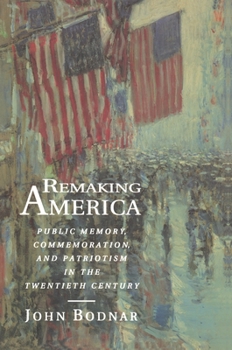Remaking America: Public Memory, Commemoration, and Patriotism in the Twentieth Century
In a compelling inquiry into public events ranging from the building of the Vietnam Veterans Memorial through ethnic community fairs to pioneer celebrations, John Bodnar explores the stories, ideas,... This description may be from another edition of this product.
Format:Hardcover
Language:English
ISBN:0691047839
ISBN13:9780691047836
Release Date:November 1991
Publisher:Princeton University Press
Length:368 Pages
Weight:1.40 lbs.
Dimensions:1.0" x 7.8" x 10.0"
Customer Reviews
1 rating
Which is more important, the facts of what actually happened in the past or the public memory of wha
Published by Thriftbooks.com User , 18 years ago
John Bodnar would certainly come down in favor of the construction of public memory. It is what defines American society, he insists, and he believes it can be and has been manipulated and altered as needed over time to serve the interests of the present. That is what commemorations are all about. The author argues in this social history of commemorations in the twentieth century United States that "pride and patriotism" dominated the cultural landscape as unifying elements of this nation. Moreover, Bodnar sees a fundamental divergence between what he calls "official memory," the explication of national themes through government-supported institutions and ceremonies such as those of the National Park Service, and "vernacular memory" expressed through local, grassroots efforts to commemorate some aspect of the past. Those "vernacular" commemorations are often built around local events and specific groups, especially ethnic ones. Through "a communicative process" between these two approaches to history, Bodnar believes, Americans construct their public memory. This is often a tense interaction with conflicting aims and messages surfacing that must be negotiated between the various participants in the commemoration. Bodnar provides a set of case studies, especially in the American Midwest, exploring these various activities. His concentration on such communities as Indianapolis and Cleveland anchor the study to the large urban centers of Middle America, and his argument's transportability to other regions and groups is appropriate to question. Even so, there is at least some reason to view this dialogue between competing "official" and "vernacular" issues as a national tendency in my experience. I worked with the U.S. Centennial of Flight Commission to commemorate the one-hundredth anniversary of the work of the Wright brothers in 2003. At the national level--an "official" memory of the event--emphasized not only the importance of the Wrights but also celebrated the evolution of flight over a century. Bodnar would see this as in keeping with past commemorative efforts, especially in its basic commitment to the idea of progress and improved well-being of the nation and its citizenry. The national commission worked with organized groups in both Dayton, Ohio, the hometown of the Wright brothers, and North Carolina, where they first successfully flew in 1903. In addition, such entities as aerospace-related professional and trade associations, federal agencies with a role in aerospace such as NASA and the FAA, aerospace corporations, and cultural institutions such as the Library of Congress and the National Park Service as well as state and local groups all had a place in the commemoration. So too did the Wright family. All of these various groups had different reasons for participating in this commemoration, possessed their own goals, and expressed sometimes conflicting priorities. Negotiating the competing voices was never easy, but it was always inte





